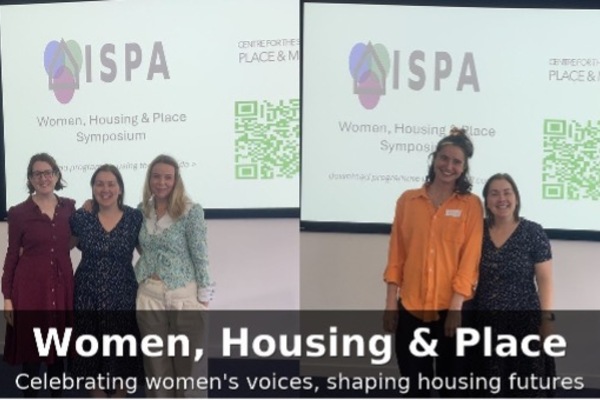Samantha V. Arbotante is an architect and instructor at the University of the Philippines Mindanao. A KU Leuven graduate in Human Settlements, she returned to the Philippines to pursue research on homelessness, inclusivity, and the right to the city. Samantha was also the recipient of the 2025 Global South Conference Bursary Scheme
Introduction
Growing up, I lived and played with my cousins in informal settings – places with no titles, boundaries, unpaved paths, and community-built houses in Davao City. Many often overlook these spots in the cities due to being built within the cities’ voids. Experiencing firsthand their daily realities, such as the lack of adequate basic services, water, electricity, and land tenure, while hearing constant eviction notices, I gained a deeper and personal understanding of what it truly means to have a secure home. This shaped my perspective on housing.
Through the bursary from the Housing Studies Association and the Housing Journal, I was honoured to present my paper on Housing and Activism, engaging a meaningful dialogue on a global platform.
From the Podium: Lasting Keynote Insights
The keynote sessions were one of the most enriching aspects of the conference. Listening to professors, lawyers, and policymakers as they highlighted critical aspects of housing in the UK, including housing laws, data, research, and pressing housing issues underscoring the complexity of the various housing landscapes, I was enlightened to understand how and what efforts were emphasized to improve tenant protections, housing standards definitions, and the importance of robust housing data in shaping effective policies. Overall, the keynote sessions provided me with a comprehensive understanding of the current environment and motivations towards advancing housing quality.
Safe Spaces Matter for Early Career Researchers!
What truly stood out to me was the conference’s commitment to fostering a safe and inclusive space for early career researchers. The Housing Studies Association’s Early Career Researcher Network (ECRN), greeted us by Nia Rees and Sadhana Jagannath, played a vital role by providing a supportive community for emerging scholars, like me, to learn to communicate. Through this ECRN initiative, I was able to attend an impact workshop and make new connections with researchers from diverse interdisciplinary backgrounds in housing studies.
Engaging with fellow researchers who share the same enthusiasm for housing issues allowed me to exchange fresh perspectives, deepen my understanding, and reflect on issues relevant to my country. Collectively, the ECRN at HSA 2025 was a pivotal platform as it was a platform for networking, learning, and improving in an informal yet empowering setting.
(Re)Defending Homes through Art: Exploring the journey of using creative protests for Urban Resistance and Right to the City of Sitio San Roque’s residents
Presenting my paper on housing and activism for the first time was an exhilarating and rewarding process. To start, below are some definitions of informal settlements:
Urban informality has historically been defined by the creativity and resourcefulness of low-income residents who gradually reimagined their living environment despite systematic limitations and constraints such as quality of housing, sites and services, tenure security, proximity to livelihood, and overall community safety (Davis, 2013). These settlements are usually unfinished settlements, due to informal processes within settlements being produced by their own inhabitants (Lara, 2009). As land values increase, the informal settlements or slums developed incrementally over time and are being challenged again by neoliberal capital through forced evictions and demolitions (Arcilla, 2020). In my paper, I explored art as a catalyst for urban resistance and how the residents and its grassroots supporters used various creative methods to assert protest and reclaim areas for their homes in one of the oldest recorded informal settlements in the Philippines, the Sitio San Roque, against capitalism of private agencies and government control. Following the concepts of insurgency and right to the city, I related the imaginative uprising strategies from the 1980s, the pandemic time, and the tactics during the post-pandemic era.
The methodology included digital ethnography, media analysis, etc. I highlighted the differences between the “hard” and “soft” strategies imposed with civic engagement. With the ongoing challenges of state-led eviction and coercion, I argued that their evolving acts reshaped the meaning of activism and resilience seen through defending and redefending their homes in the heart of Quezon City’s rapidly developing urban location.
Looking Back, Moving Forward
Now, being back at home from the conference, attending HSA 2025 was more than just presenting a paper; it was about joining a vibrant and supportive community committed to understanding and improving housing. To summarise, below are themes I reflected on throughout the conference:
Inclusivity: The hybrid format of the conference, combining in-person and online sessions, allowed for much wider participation across platforms.
Bridging Theory and Practice: Through the various workshops I attended, I appreciated how the diverse lectures and presentations between academics and practitioners highlighted the impact of connecting research and real-world applications.
Empowerment of Early Career Researchers: Having a dedicated safe space and network for ECRs is not just supportive but also essential in the future of housing research.
I am grateful for this once-in-a-lifetime opportunity, as through these bursary efforts, I was able to share my work, my country’s stories, and learn from amazing individuals. This experience strengthened my resolve to contribute meaningfully to this field and to support more fellow researchers, particularly from the Global South. I encourage more to join and attend the future events of HSA for more impacts, as it all starts within us. As Nia has told us, we all just need to “be brave”.
Bibliography
Arcilla, Chester. 2020. “Neoliberalizing Subaltern Political Socialities: Community Barricade and the Diverse Grassroots Struggles for Adequate Housing in the Sitio San Roque Slum.” Ethnographies of Development and Globalization in the Philippines Emergent Socialities and the Governing of Precarity, January. https://doi.org/10.4324/9781003037842.
Davis, M.: Planet of Slums. Verso, New York, NY, USA (2006).
Lara, F.L.:The Form of the Informal: Investigating Brazilian Self-Built Housing Solutions. In Rethinking the Informal City: Critical Perspectives from Latin America (Hernández, F., Kellett, P., & Allen, L.K., Eds.), pp. 23–38. Berghahn Books, New York, NY, USA (2010).








